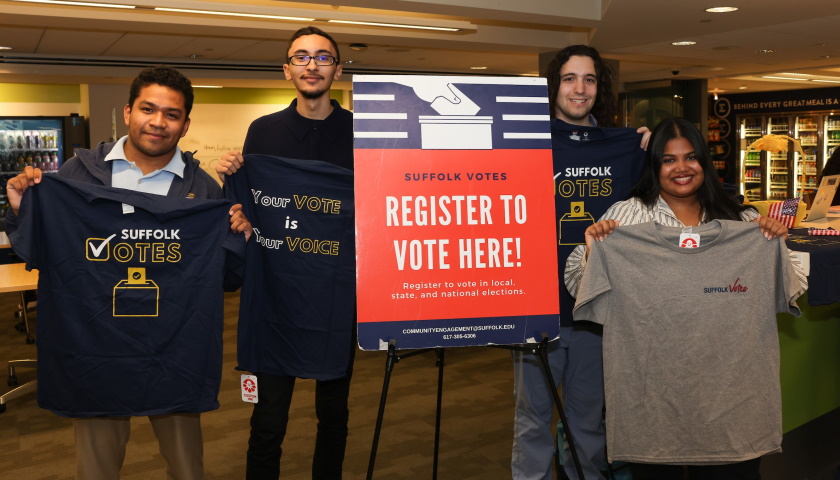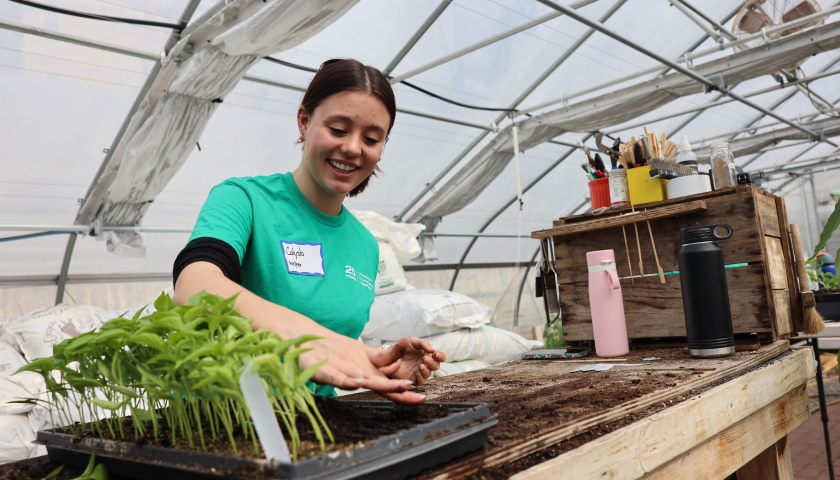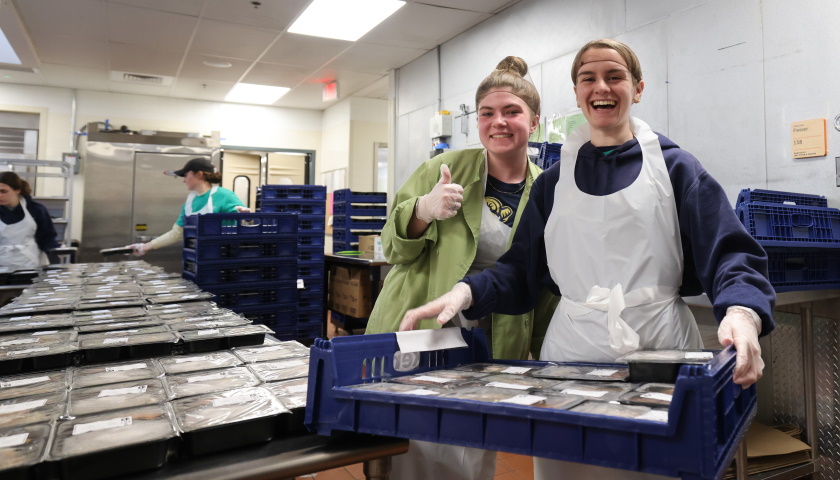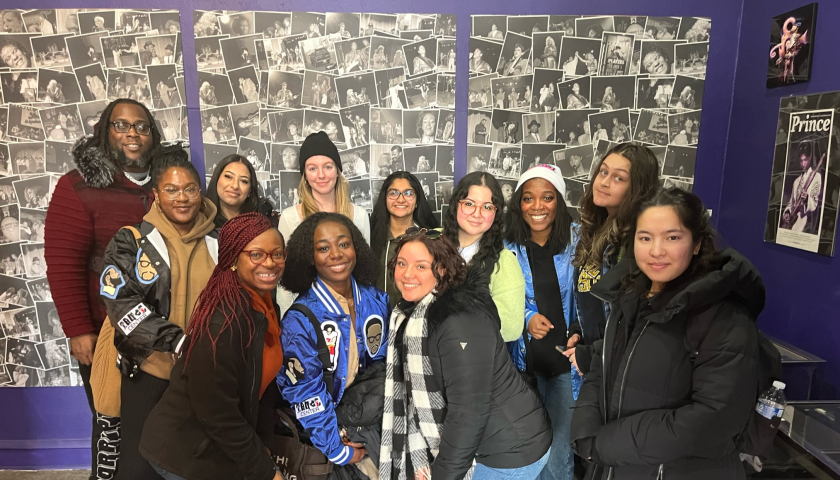Where Service Matters

When Zachary Rodrigues was a freshman at Suffolk he was already thinking four years ahead to his law school applications. Working with Suffolk Votes, a nonpartisan civic education initiative run by the Center for Community Engagement (CCE), seemed like a good résumé-builder. But as he began to visit classrooms to talk to peers about the voting process unexpected things happened. He began to overcome his natural shyness. He became energized by the work he was doing to fight youth voter apathy.
Three years and multiple elections later, the undergraduate law major is staggered by all he’s gained by getting involved—professional skills like public speaking, yes, but also his core group of friends, and the satisfaction that he’s part of a collective, statewide effort that led to a 33% increase in registered voters ages 18-24 in Massachusetts between 2018 and 2022.
“I underestimated how something as simple as sitting at a table handing out voter registration flyers became an opportunity to build skills, and how just talking to someone could help them realize their vote matters,” says Rodrigues.
The CCE, which marked its 25th anniversary earlier this year, is a hive of activity on campus, coordinating the efforts of hundreds of volunteers like Rodrigues, who partner with more than 80 different community organizations in Boston and well beyond. Together they’re not only making an outsized impact on pressing issues—supporting unhoused people, helping underserved preschoolers prepare for academic success, and increasing civic participation—they’re also earning national recognition for their work.
This fall, Washington Monthly ranked Suffolk 24th out of more than 300 national universities in its annual college survey for its record of service.

Suffolk has also previously earned recognition from the Carnegie Foundation as a Community Engagement Classified Institution, one of only 75 colleges and universities to be so recognized in 2020.
In its service ranking, the Washington Monthly looked at a number of indicators including Carnegie Community Engagement Classification, voting engagement, and Peace Corps, AmericCorps, and military service. The publication also considered the percentage of federal work-study grant money spent on community service projects as a measure of how much colleges prioritize community service. Many students working with Suffolk’s Center for Community Engagement hold work-study positions as office assistants and project leaders for ongoing service partnerships. Students in the Service Scholar Program commit to working up to 300 hours per academic year; in turn they receive both intensive on-the-job training and $5,000 in wages and tuition remission.
Learning to serve, preparing to lead
According to Velez, while service has always been part of the fabric of the Suffolk community, the current generation of students are particularly motivated. They see a problem like the housing crisis and respond with drives for food and linens, prepare and serve meals at local soup kitchens, and help make congregate housing more comfortable for residents. She views the Center’s role as helping to harness and direct students’ energy so they can do the most good while learning to both serve and lead

Emily Gonzalez de Los Santos, a junior honors student majoring in criminal justice, cares deeply about social justice issues. A first-generation student, she says she is driven in part by personal experience and plans to pursue further study in immigration law after graduation “to help people like my mom who didn't have the resources to help better herself.”
As an RA, orientation leader, and diversity peer educator, Gonzalez de Los Santos was already engaged on campus. Participating in Alternative Spring Break (ASB) through the CCE has helped her broaden her understanding of the societal issues she’s learning about in her program while gaining valuable leadership skills in the real world.
Last year, she served as a student leader for Suffolk’s ASB trip to Minneapolis, focused on racial justice. Meeting with community organizations and participating in service in a city still grappling with the aftermath of the murder of George Floyd was both rewarding and challenging. In such an emotionally charged environment, tensions sometimes flared.
“One major skill I learned is conflict resolution,” says Gonzalez de Los Santos. “None of us grew up the same. We’re from different parts of the country and even the world, and sometimes ignorant statements can come from well-meaning people.”
She learned how to take other students aside to have conversations that aren’t judgmental or confrontational but rather educational, she says.

Rodrigues has found ways to keep the lines of communication open through his time at Suffolk Votes, too. “We’re a nonpartisan group, so you have to be open-minded to everyone's beliefs and ideas. It’s eye-opening to see how different we can be when we all live in the same country.”
As he heads into his final semester, Rodrigues looks forward to engaging with classmates during a presidential election year. He also plans to participate in ASB for the first time, hoping to gain more perspective on how people live in different parts of the country, and to dig into hands-on work helping others. “That’s the biggest appeal to me: working with a team to make a difference elsewhere, not just in Boston.”
Though Gonzalez de Los Santos calls the ASB trip to Minneapolis “the best time of my life,” she is working to improve upon the experience as she helps plan next spring’s racial justice trip to New Orleans. “We want to emphasize that racial justice impacts disparate communities. New Orleans is perfect because it was one of the major ports for immigration, so we get to touch upon different ethnicities and identities. We want to educate ourselves both on historic moments, but also present moments and New Orleans’ rich culture.”
Reflecting on their many hours spent volunteering in the CCE, both Gonzalez de Los Santos and Rodrigues have the same advice for students just starting at Suffolk: Don’t be afraid to get involved.
“The worst thing that can happen if you attend a meeting is that you might be bored for an hour,” says Gonzalez de Los Santos.
But when you find a way to align your interests with the right volunteer opportunity your whole life could change, says Rodrigues.
“A lot of my closest friends, we all met in the CCE office. It’s like a second family almost because we’re all so different, but we share a passion for working for our causes.”
Media Contact
Greg Gatlin
Office of Public Affairs
617-573-8428
[email protected]



